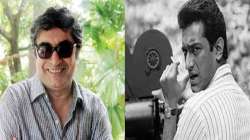Seeing Satyajit Ray through the lense of 'Aparajito' director Anik Dutta
With the Cannes Film Festival celebrating its 75th edition this year and India being the Country of Honour, the festival will screen Satyajit Ray's acclaimed movie 'Pratidwandi' (1970).

Filmmaker Anik Dutta, who has helmed 'Aparajito', which narrates the story of the struggles of Satyajit Ray during the making of his iconic film 'Pather Panchali', says that the process of revisiting the film and Ray's oeuvre was like his personal route to self-discovery.
Most of Ray's films, because of their socio-political undertones, continue to be relevant in the present time, Dutta added.
'Aparajito' was premiered on Monday evening during the launch of a film festival to mark Ray's birth centenary by the National Museum of Indian Cinema in Mumbai.
'Pather Panchali', completed by Ray in 1955, was one of the milestones for Indian cinema globally. After getting the National Award for Best Feature Film, 'Pather Panchali' went on to bag international honours, including the prize for Best Human Document at Cannes in 1956. Making a film on such an acclaimed film, naturally, was a challenge for Dutta.
In conversation with IANS, Dutta said: "People's expectations started rising from the time they got to know that I was making a film on Manikda (Ray was fondly addressed by this name across Bengal). This is the first time an actor has played Manikda on-screen.
"A lot has been written about and extensive conversations have taken place on 'Pather Panchali', so I have not tried to do anything based on these notes. I have only captured the struggle before the creation of 'Pather Panchali'. Revisiting that struggle was like a path of self-discovery for me."
Dutta, however, hastened to mention that logistically the challenge was nothing compared to what Ray went through to make the film based on Bibhuti Bhushan Bandyopadhyay's novel that captures the grittiness of rural life and a family's attempts to escape from it by migrating to the city.
"I mean it was unthinkable back then to make a film like that because not only was there no financial support, but also technologically we were not that advanced," Dutta said. "Everyone in the film crew was new, so one can find flaws there, but that did not stop us from getting mesmerised by the magic it created on-screen. The frames that captured the beauty of Bengal are pure magic."
On a personal note, the director, who is best known for his critically acclaimed film 'Bhooter Bhabishyat', said: "I hope I have justified being the given the opportunity and the audience will like it because, I repeat, I know the expectations people have from it."
In the film, award-winning popular actor Jeetu Kamal portrays Satyajit Ray. The director says that finding the actor was the most important part of the film.
"Look, I do not believe in God that much, or you could say I am not a religious person," Dutta said. "But if miracles do happen, finding Jeetu was certainly one! Manikda was 6 ft tall and he was quite a handsome man with a unique personality. So, when we first saw Jeetu, my makeup artist Somnath Kundu and I thought of sitting him down for a look test and photoshoot. Jeetu has a physical similarity with Ray."
Dutta continued: "By the time Somnath completed the hair, makeup, dress, everything, and looked at the mirror, he got scared for a moment and called me to the makeup room to point to the uncanny similarity! It was as if Manikda was sitting in front of us!"
This year the world celebrate the 101th birth anniversary of Ray (his birth centenary could not be celebrated with live events because of the Covid-19 pandemic), and most of his films, even after all these years, continue to be relevant.
Commenting on this observation, Dutta said: "Well, he captured the time he was living in, even though all his films are not so-called political dramas, we sense the political undertones in them. Some of them are allegorically political, but those were some of the bolder statements from him.
"A film such as 'Ashani Sanket' was one such film. But you see that even though 'Hirak Rajar Deshe' is a children's film, we know how relevant its message is even now. Ray is evergreen!"